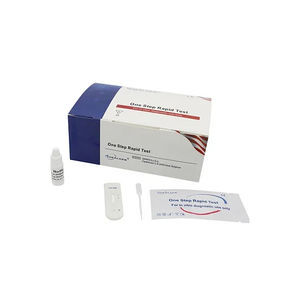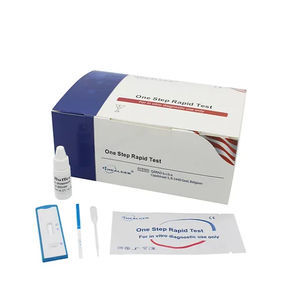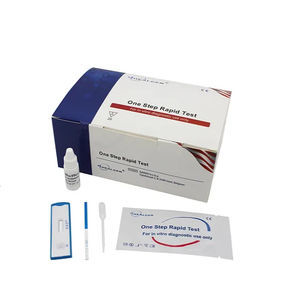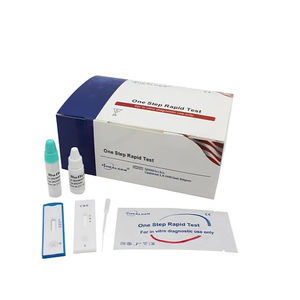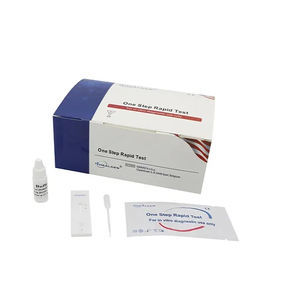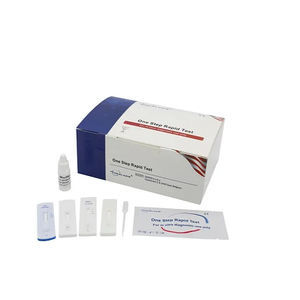
- Laboratory
- Laboratory medicine
- Rapid cardiovascular disease test
- Healgen Scientific

- Products
- Catalogs
- News & Trends
- Exhibitions
Rapid cardiovascular disease test GDCAR seriesproteinmyoglobincTnI
Add to favorites
Compare this product
Characteristics
- Applications
- for cardiovascular diseases
- Tested parameter
- protein, myoglobin, cTnI, cardiac troponin I, creatine kinase
- Sample type
- blood, serum, plasma, whole blood, tissue
- Analysis mode
- chromatographic immunoassay, molecular
- Format
- cassette
- Result display time
10 min
- Specificity
95.6 %, 97 %, 98.7 %
- Sensitivity
93.4 %, 94 %, 96.2 %
Description
The Myoglobin/CK-MB/Troponin I Combo Test is a rapid chromatographic immunoassay for the qualitative detection of human Myoglobin, CK-MB and cardiac Troponin I in whole blood, serum or plasma as an aid in the diagnosis of myocardial infarction (MI).
Myoglobin (MYO), Creatine Kinase MB (CK-MB) and cardiac Troponin I (cTnI) are proteins released into the bloodstream after cardiac injury. Myoglobin is a heme-protein normally found in skeletal and cardiac muscle with a molecular weight of 17.8 kDa. It constitutes about 2 percent of total muscle protein and is responsible for transporting oxygen within muscle cells. When muscle cells are damaged, Myoglobin is released into the blood rapidly due to its relatively small size. The level of Myoglobin increases measurably above baseline within 2 - 4 hours post-infarct, peaking at 9 - 12 hours, and returning to baseline within 24 - 36 hours.
CK-MB is an enzyme also present in the cardiac muscle, with a molecular weight of 87.0 kDa. Creatine Kinase is a dimeric molecule formed from two subunits designated as “M” and “B”, which combine to form three different isoenzymes, CK-MM, CK-BB and CK-MB. CK-MB is the isoenzyme of Creatine Kinase most involved in the metabolism of cardiac muscle tissue. The release of CK-MB into the blood following an MI can be detected within 3 - 8 hours after the onset of symptoms. It peaks within 9 to 30 hours, and returns to baseline levels within 48 to 72 hours.
Cardiac Troponin I is a protein found in cardiac muscle, with a molecular weight of 22.5 kDa. Troponin I is part of a three subunit complex comprised of Troponin T and Troponin C.
Exhibitions
Meet this supplier at the following exhibition(s):

Related Searches
- Assay kit
- Immunoassay assay kit
- Infectious disease detection kit
- Blood rapid diagnostic test
- Rapid lateral flow test
- Immunoassay rapid diagnostic test
- Molecular test kit
- Cassette rapid diagnostic test
- Respiratory infection test kit
- Rapid virus test
- Serum rapid diagnostic test
- Plasma rapid diagnostic test
- Optical assay kit
- Infectious disease rapid diagnostic test
- Whole blood rapid diagnostic test
- Fluorescence assay kit
- Lateral flow test kit
- COVID-19 assay kit
- Rapid respiratory infection test
- Urine rapid diagnostic test
*Prices are pre-tax. They exclude delivery charges and customs duties and do not include additional charges for installation or activation options. Prices are indicative only and may vary by country, with changes to the cost of raw materials and exchange rates.

